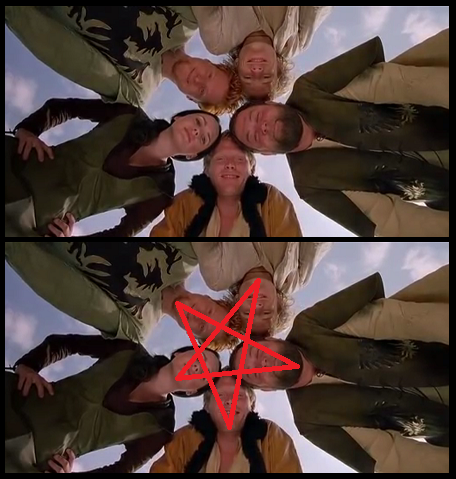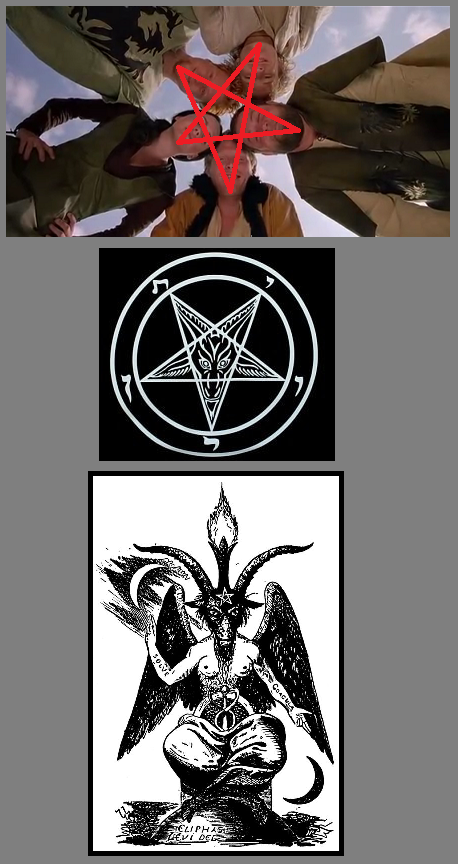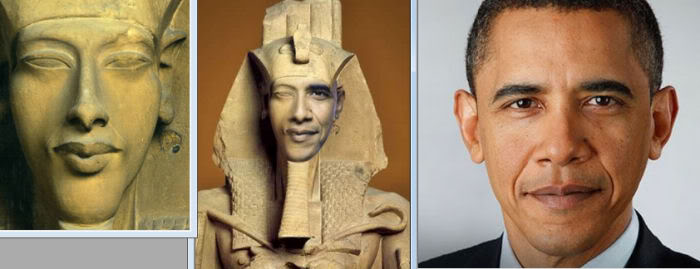It looks like you're using an Ad Blocker.
Please white-list or disable AboveTopSecret.com in your ad-blocking tool.
Thank you.
Some features of ATS will be disabled while you continue to use an ad-blocker.
share:
"A Knight's Tale" - New World of Will
The 2001 film; A Knight's Tale, follow's the inspirited journey of a lowly peasant's quest for acceptance, respect, and love, through medieval tournament competition.
The film is chock-full of meaning and symbolism. As a picture is worth a thousand words, so to does every film have a different meaning to different people. Although I do not know the motives or intentions of the artist's work, I will give my personal interpretation of the film.
I hope you enjoy this analysis, and please share your thoughts also.
Peace.
(Spoiler Alert)
Film Plot
The film follows peasant; William Thatcher (played by; Heath Ledger). With the aid of his motley crew, William uses forged papers of nobility to compete in the jousting circuit under the assumed pseudonym of Sir Ulrich von Liechtenstein of Gelderland. William's tournament winnings bring him wealth and fame, the quality of his character earns the respect of Prince Edward and the love of Jocelyn, while his success gains the envy of antagonist; Count Adhemar.
William's forged nobility, a criminal offense, is uncovered and exposed by Adhemar. William then falls from grace, as he is humiliated, arrested, and banned from tournament competition. William's admirable character qualities lead to Prince Edward (played by; James Purefoy) granting William a full pardon, a royal decree of nobility, and a public knighting. William goes on to win the final tournament by defeating his arch-nemesis; Adhemar, and winning the lady of his heart; Jocelyn.
Plot Types
In addition to the Hero's Journey monomyth, "A Knight's Tale" also follows the 7 plot-types presented by Christopher Booker's; The Seven Basic Plots:
• Overcoming the Monster
The "monster" may be Adhemar and/or the social caste/class system.
• Rags to Riches
William gains wealth and prestige through tournament competition.
• The Quest
William and his companions embark on a quest for wealth, love, and challenging the status-quo.
• Voyage and Return
As a child, William is sent away by his father to serve as a squire to a knight. After many years, William returns home with the experiences and attainments of his quest.
• Comedy
The film includes many humorous moments and comedic relief.
• Tragedy
William's tragedy and hinderance is his misfortune of being born a poor peasant.
• Rebirth
The totality of the quest leads to William's rebirth from an inexperienced boy to a man of good character, and from peasant to noble.
Character Archetypes
William, Adhemar, and Jocelyn form a dynamic trinity. Not only do they illustrate the battle of good and evil for the prize, but they also symbolize the Jungian 3-fold model of the psyche.
• William Thatcher
Ego. Protagonist. Hero. Good.
William's heroic quality is reinforced when Jocelyn refers to him as a "Hunter", which is then connected to the ending scene of the film where the camera pans away to the Orion constellation.
• Count Adhemar (played by; Rufus Sewell)
Id. Antagonist. Villain. Evil.
• Jocelyn (played by; Shannyn Sossamon)
Super-Ego. Maiden. Treasure. Purity.
William's band of companions represent key Jungian archetypes, as well as aspects of William's own psyche.
• Roland (played by; Mark Addy)
Fatherly figure. Wisdom. Adviser. Strength.
• Kate (played by; Laura Fraser)
Motherly figure. Emotion. Creative force. Hope.
It is interesting to note that Kate was drawn into the adventure by William questioning her creative talents, which stirred her emotions into taking action.
• Wat (played by; Alan Tudyk)
Brotherly figure (son). Understanding. Sidekick. Rashness.
He serves as a mirror (Wat / What?), and also serves as William's anima.
• Geoffrey Chaucer (played by; Paul Bettany)
Trickster. Intellect. Herald. Passion.
The Power of Will
The main and overarching theme of the film is: Will Power
The film begins with a youthful William and his father, a roof-thatcher, in audience of a parade. William beholds the awe-inspiring knights of noble birth, and dreams of becoming a knight himself. In spite of his low social class, William's father assures him that he can, "change his stars". This glimmer of hope becomes the motivating factor for William's quest to overcome the hand that fate has dealt him.
William's name is a deliberate wink to this theme.
William is a compound name, combining the two words:
"will" + "helm"
"will" + "protection"
Meaning; "His will is protected"
After receiving Jocelyn's declaration of love and Prince Edward's bestowal of nobility, newly knighted; Sir William, proceeds to the championship joust against Adhemar. In his last trial to obtain honor and respect, William defeats Adhemar in the final round of their joust.
In a proclamation of both his birth name and his triumph over fate, Sir William roars, "William!", as he delivers the final vanquishing blow to Adhemar.
This declaration may be interpreted as;
"Will I am"
"I am will"
"My will is protected"
"William's will has been done"
In another nod to "will", as Adhemar lay on the ground defeated, William and his companions hover atop the Count. As William joins the group, an inverted pentagram is formed by their heads. William then says;
"Welcome to the New World. God save you, if it is right that He should do so."
This "New World" is one in which;
"Where there's a will, there's a way."

The inverted pentagram is often symbolic for matter over spirit and the cultivation of wants and desires, which is the practice of will.
In another interpretation, we may take Adhemar as representing the Old World Order of rule by entitled royal and noble birthright, and William as representing the common people of the world. William's victory over Adhemar signifies the defeat of the caste system, with the heralding of the "New World" referring to the rise of democratic republics; all an allusion to the Age of Revolution.
(In an attempt to entertain our tinfoil-wearing Brethren, this supplemental post should be taken as satire.)
[In the voice of a famous YouTuber]
Hi everybody! Welcome to "The Illuminati Never Sleeps"! Please, please subscribe to all of my websites and media accounts and share all of my videos and help them go viral! Every click earns me advertising credits and more money!
I'll expose the Satanic, New World Order, Illuminati, el-em-en-oh-pee system like no one else in the entire multiverse! I'll jumble together lots of unconnected dots and mix up different belief systems in order to accuse everyone and everything of being Satanic!
To begin, the name of the movie is Satanic! It's called "A Knight's Tale" because it's a "tale", meaning a "lie". And who exactly is the "Father of Lies"? BINGO! That's right folks; Satan! The Illuminati uses the word "Knight" in the movie title because it's a homophone of "Night", and "night" represents "darkness", and everyone knows that night and darkness are Satanic! So the movie is actually named "Satan's Lies"! So be careful watching this film, because Satan will be trying to deceive you with his lies.
We saw that Sahabi on ATS connected the character of Geoffrey to the Trickster, the Intellect, and Passion. As everybody knows, these three things are Satanic! Geoffrey is naked and in serious financial trouble when he first meets William. First of all, people are not naturally born naked. Nakedness is an alien concept to the planet Earth. So Geoffrey's nakedness is screaming at us: Not-natural, dirty, and sinful! Geoffrey is naked and in debt because he reached rock-bottom, which means he "fell", and that's how we know he is a Satanic character because Satan is a "fallen" angel!
Even William's name; Will-I-Am, is a blasphemy against God! Will is not "I AM", because only God and Yeshua can call themselves "I AM". Even Popeye the Sailor Man doesn't dare;
"I yam what I yam and that's all that I yam."
*Bonus gem for you; yams are Satanic!
And finally, William's head finishes the upside down star because it's all promoting the Satanic system! It's the Devil, it's Satan, and it's Baphomet! Yep, as plain as day folks, it's an Illuminati Baphomet!

After casting a spell to invoke the demonic Baphomet, William says "Welcome to the New World", because he's welcoming us to the New World Order! And the whole message of the Satanic Illuminati is;
"Do what thou wilt (will) shall be the whole of the law".
Do your will and get the money, the fame, and the girl like William did! What a heretic! He should have kept to the pecking order and stayed a peasant. By following his own will instead of following fate, he went against God's plan, and all of it is Illuminati, Satanic, and NWO!
And as a super-dee-duper bonus, I'll reveal to you guys how "A Knight's Tale" is even Illuminati predictive-programming! That's right folks, you heard it here first! "A Knight's Tale" was released on May 11, 2001. In the movie, Heath Ledger welcomed us to the New World Order, and exactly 4 months to-the-day, the 9/11 attacks against the U.S. happened. It is an impossible coincidence to ignore! The number 4 represents the Illuminati, Satan, and Mark of the Beast!
And in the movie, William gets ahead in life by using the forged paperwork of his Satanic friend Geoffrey. This perfectly predicts how Barack Obama became President of the United States by using the forged paperwork of his fake birth-certificate. In fact folks, Obama doesn't have a birth-certificate because he was never born! He's an immortal Illuminati clone of Egyptian Pharaoh Akhenaten!
"A Knight's Tale" was a Satanic predictive-programming of the 9/11 Attacks and the establishment of the Illuminati's New World Order system.
Thank you for watching my videos, and may the money be blessed that I am going to make off of your views and clicks, and please oh please, don't forget to subscribe and share!
edit on 3/9/17 by Sahabi because: (no reason given)
a reply to: Sahabi
Don't forget free will. Or more appropriately, free Willy...

I think a whale makes a sound kinda like
" eeeeee ooooooooooooooooo oooooooo."
Seems about right. There really should be a google whale translator. Maybe Latin to humpback? Could "teach" our sea friends about whale jesus.
Also, i think free will has another connotation in the "bill" form. Something about stacks of unpaid utilities bills and "bill power".
Don't forget free will. Or more appropriately, free Willy...

I think a whale makes a sound kinda like
" eeeeee ooooooooooooooooo oooooooo."
Seems about right. There really should be a google whale translator. Maybe Latin to humpback? Could "teach" our sea friends about whale jesus.
Also, i think free will has another connotation in the "bill" form. Something about stacks of unpaid utilities bills and "bill power".
edit on 9-3-2017 by CreationBro because: (no reason given)
Excellent... The only comment I can find is... Its really odd you said that Obama was akhenaten. I know it was just satire but... I knew a shroomie
that claimed the exact same thing.
a reply to: Sahabi
Echooooes, aesthetic storylines..
Soooo do you have a nine worthies for me, simplifed =)
In addition to the Hero's Journey monomyth, "A Knight's Tale" also follows the 7 plot-types presented by Christopher Booker's; The Seven Basic Plots:
• Overcoming the Monster
The "monster" may be Adhemar and/or the social caste/class system.
• Rags to Riches
William gains wealth and prestige through tournament competition.
• The Quest
William and his companions embark on a quest for wealth, love, and challenging the status-quo.
• Voyage and Return
As a child, William is sent away by his father to serve as a squire to a knight. After many years, William returns home with the experiences and attainments of his quest.
• Comedy
The film includes many humorous moments and comedic relief.
• Tragedy
William's tragedy and hinderance is his misfortune of being born a poor peasant.
• Rebirth
The totality of the quest leads to William's rebirth from an inexperienced boy to a man of good character, and from peasant to noble.
Echooooes, aesthetic storylines..
Soooo do you have a nine worthies for me, simplifed =)
a reply to: CreationBro
Hahaha! I heard Dori's voice as I read your reply
Now, we can't have our wills running free if we don't first have them under control! And that's where the bills come in; bills to control the wills. Both financial bills, and the bill that's sitting up on Capital Hill.
Hahaha! I heard Dori's voice as I read your reply
Now, we can't have our wills running free if we don't first have them under control! And that's where the bills come in; bills to control the wills. Both financial bills, and the bill that's sitting up on Capital Hill.
a reply to: CulturalResilience
Thank you, thank you
a reply to: LucidWarrior
There was a laughable fringe theory that Obama is Akhenaten's clone

Thank you, thank you
a reply to: LucidWarrior
There was a laughable fringe theory that Obama is Akhenaten's clone

a reply to: Sahabi
Great thread!
I have seen that movie over a hundred times no lie..I didn't have television or internet up here for nearly four years but I did have this movie on DVD...
The symbolism is laid out through the entire film in a very well done manner
You should if you get a chance listen to the directors commentary.. it is an amazing chat between Helgeland(sp) and Paul bettany as they watch the movie and pound beers. Seriously check it out!!!
Or I will Fong you in the hole of your ass!!!
Respectfully,
~meathead
Great thread!
I have seen that movie over a hundred times no lie..I didn't have television or internet up here for nearly four years but I did have this movie on DVD...
The symbolism is laid out through the entire film in a very well done manner
You should if you get a chance listen to the directors commentary.. it is an amazing chat between Helgeland(sp) and Paul bettany as they watch the movie and pound beers. Seriously check it out!!!
Or I will Fong you in the hole of your ass!!!
Respectfully,
~meathead
a reply to: Mike Stivic
Fong! Nice reference
I haven't seen the director's cut, I'll check it out if I ever encounter it. Do they make any mention of symbolism? The first time I saw the film, the inverted pentagram really caught my eye. Ever since, I've been scouring the movie for hints of symbolism.
For example:
William represents "good" and Adhemar represents "evil". During their final joust, William takes off his armor and duels in his white shirt, while Adhemar continued the battle wearing his black armor. Also, from the orientation of the camera, William is positioned on the right, while Adhemar is positioned on the Left. This symbolism reinforces the theme of Good triumphing over evil.
Fong! Nice reference
I haven't seen the director's cut, I'll check it out if I ever encounter it. Do they make any mention of symbolism? The first time I saw the film, the inverted pentagram really caught my eye. Ever since, I've been scouring the movie for hints of symbolism.
For example:
William represents "good" and Adhemar represents "evil". During their final joust, William takes off his armor and duels in his white shirt, while Adhemar continued the battle wearing his black armor. Also, from the orientation of the camera, William is positioned on the right, while Adhemar is positioned on the Left. This symbolism reinforces the theme of Good triumphing over evil.
a reply to: Sahabi
They cover a lot of ground.they are good friends in real life. From the actor who played adamar hosting live sex parties in Prague to symbolism.. it is really a good watch..
Remember the scene after they hock the first prize? Well helgeland points out when Rolandtells William he's going the wrong way its a referance to the road less traveled..the man knows his symbolism.. and its all over the movie from the wardrobe changesto the color schemes..
It really is worth the watch.
Respectfully,
~meathead
They cover a lot of ground.they are good friends in real life. From the actor who played adamar hosting live sex parties in Prague to symbolism.. it is really a good watch..
Remember the scene after they hock the first prize? Well helgeland points out when Rolandtells William he's going the wrong way its a referance to the road less traveled..the man knows his symbolism.. and its all over the movie from the wardrobe changesto the color schemes..
It really is worth the watch.
Respectfully,
~meathead
Maybe someday we will get back to the real story of who does the Holy Grail serve. Then maybe we can return to a time when politicians know their
place in the world.
a reply to: Sahabi
I actually believe you gave it a reference to a movie out of context to the subject, i dont think it has a symbolic meaning in the way you describe it..
The nine worthies could be referred to in a way as nine pillars, the way an artifact works is that it brings a story to the table using a "thing", like a sheriff badge of the wildwest, or a cross, a swastika, longinus spear, the apple, the pentagram differs in cultures with its meaning, but the universal symbolic of it is the same no matter where on this world you are..
I could paint the holy grail from start to finish without any problem, i know another mystic would paint it in the same way 5000+ years from now.. The pentagram is just a cultural reference, an echo
I actually believe you gave it a reference to a movie out of context to the subject, i dont think it has a symbolic meaning in the way you describe it..
The nine worthies could be referred to in a way as nine pillars, the way an artifact works is that it brings a story to the table using a "thing", like a sheriff badge of the wildwest, or a cross, a swastika, longinus spear, the apple, the pentagram differs in cultures with its meaning, but the universal symbolic of it is the same no matter where on this world you are..
I could paint the holy grail from start to finish without any problem, i know another mystic would paint it in the same way 5000+ years from now.. The pentagram is just a cultural reference, an echo
new topics
-
Drones On Live Beach Cam New Jersey.
Aliens and UFOs: 57 minutes ago -
Christmas Dinner ??
Food and Cooking: 1 hours ago -
Merry Christmas !!
General Chit Chat: 4 hours ago
top topics
-
This is an interesting picture. Do we actually pick our leaders?
Politicians & People: 15 hours ago, 11 flags -
U.S. Govt Agencies That Protect Criminals in Government - National Archives Records Admin-NARA.
Political Conspiracies: 17 hours ago, 7 flags -
Merry Christmas !!
General Chit Chat: 4 hours ago, 5 flags -
Christmas Dinner ??
Food and Cooking: 1 hours ago, 2 flags -
Drones On Live Beach Cam New Jersey.
Aliens and UFOs: 57 minutes ago, 2 flags
active topics
-
Merry Christmas !!
General Chit Chat • 9 • : Naftalin -
Christmas Dinner ??
Food and Cooking • 1 • : Naftalin -
Trump says ownership of Greenland 'is an absolute necessity'
Other Current Events • 32 • : andy06shake -
Panamanian President-“every square meter” of the Panama Canal belongs to Panama.
New World Order • 39 • : RottenRandy -
This is an interesting picture. Do we actually pick our leaders?
Politicians & People • 9 • : NorthOS -
Post A Funny (T&C Friendly) Pic Part IV: The LOL awakens!
General Chit Chat • 7948 • : baddmove -
F-18 shot down over Red Sea....by our own Destroyer?
Other Current Events • 17 • : matafuchs -
Drones everywhere in New Jersey ---and Elsewhere Master Thread
Aliens and UFOs • 227 • : alldaylong -
Drones On Live Beach Cam New Jersey.
Aliens and UFOs • 0 • : alldaylong -
NYPD arrests migrant who allegedly set woman on fire on subway train, watched her burn to death
Breaking Alternative News • 42 • : xuenchen
